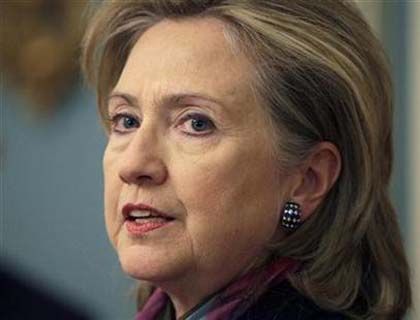HONOLULU - With the United States facing a multipronged challenge from China, Secretary of State Hillary Clinton declared Thursday that the 21st century will be "America's Pacific century" and said the region's problems require U.S. leadership. While stressing that the Obama administration will seek improved ties with China, Clinton used a speech ahead of an Asia-Pacific summit here to dissuade Beijing and others from thinking the United States is ceding its traditional role in the Pacific.
"There are challenges facing the Asia-Pacific right now that demand America's leadership, from ensuring freedom of navigation in the South China Sea to countering North Korea's provocations and proliferation activities to promoting balanced and inclusive economic growth," she said.
Clinton's remarks, in a speech at the East-West Center, were part of a campaign by President Barack Obama to "pivot" U.S. foreign policy to focus more intensely on Asia after a decade of war in Iraq and Afghanistan.
"It is becoming increasingly clear that, in the 21st century, the world's strategic and economic center of gravity will be the Asia-Pacific, from the Indian subcontinent to western shores of the Americas," she said.
"One of the most important tasks of American statecraft over the next decade will be to lock in a substantially increased investment -- diplomatic, economic, strategic, and otherwise -- in this region," Clinton told students and scholars at the East-West Center, a Honolulu think tank.
While saying China and the United States needed to cooperate to stimulate global economic growth, Clinton delivered criticisms of Beijing's human rights policies that were certain to anger China's leaders.
"We are alarmed by recent incidents in Tibet of young people lighting themselves on fire in desperate acts of protest, as well as the continued house arrest of the Chinese lawyer Chen Guangcheng," Clinton said, referring to recent cases in China.
At least nine people have set fire to themselves in Tibetan parts of China in recent months in protests against Chinese rule. Protests over the long detention of blind legal activist Chen has led to beatings of dozens of activists.
Clinton said Washington aimed to forge in the Asia-Pacific region in this century a network similar to the transatlantic network of institutions and relationships that the United States and its allies in Europe built in the 20th century.
"Today, there is a need for a more dynamic and durable transpacific system -- a more mature security and economic architecture that will promote security, prosperity, and universal values; resolve differences among nations; foster trust and accountability; and encourage effective cooperation on the scale that today's challenges demand," she said.
ECONOMICS "FRONT AND CENTER"
While bolstering security and political ties, the United States would make economic issues "front and center" in relationships in the region, pushing to open markets for trade and investment, Clinton said.
"To accomplish these goals, we must create a rules-based order -- one that is open, free, transparent, and fair," she said.
While insisting the United States was not trying to "constrain" China, Clinton sent a message to regional allies that Washington would be a counterbalance to Beijing's economic and military clout and would demand it play by trade rules.
"U.S. firms want fair opportunities to export to China's markets and a level playing field for competition," she said in a speech shortly after Chinese President Hu Jintao arrived.
Chinese firms want to be able to buy more high-tech products from the United States, make more investments here, and be accorded the same terms of access that market economies enjoy," she said.
Clinton said the United States and China needed to cooperate to ensure "strong, sustained, and balanced future global growth" and to improve opportunities for the two countries' businesses to compete in each other's markets.
"We are working with China to end unfair discrimination against U.S. and other foreign companies or against their innovative technologies, remove competition-distorting preferences, allow its currency to appreciate more rapidly, and end measures that disadvantage or pirate foreign intellectual property," she said.
Clinton later met Chinese Foreign Minister Yang Jiechi for talks on global and bilateral issues. A senior State Department official said China recognized a U.S. role in the region.
"We are a fact on the ground in the Asia-Pacific region and I think China recognizes that and seeks to work with us," said the official, who spoke on condition of anonymity. (Reuters)

